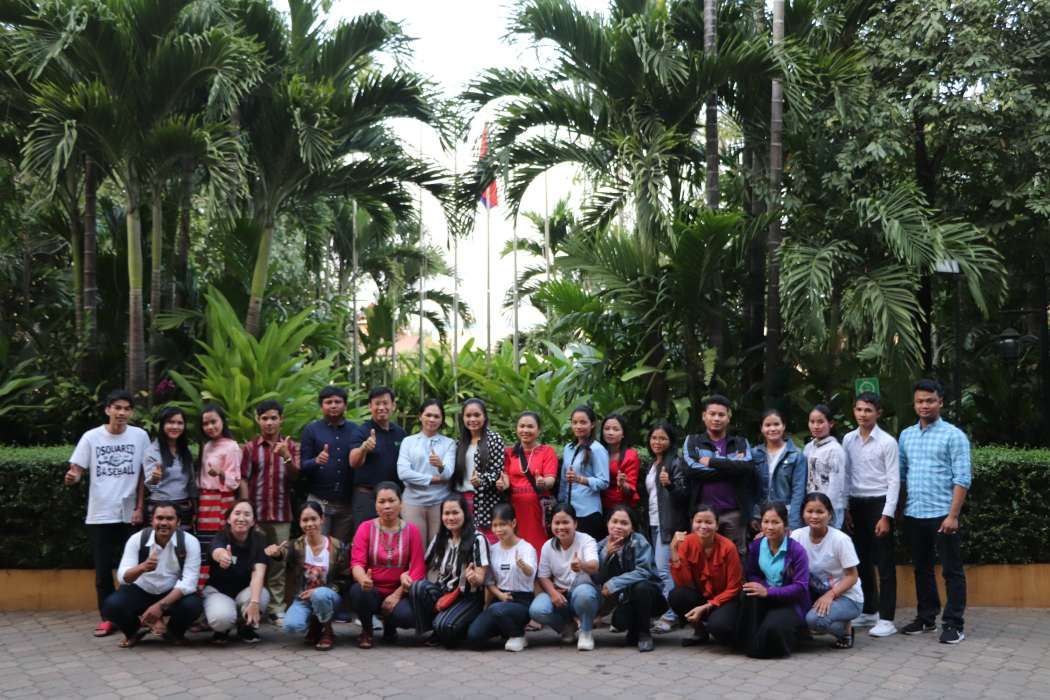អបអរសាទរទិវាអន្តរជាតិជនជាតិដើមភាគតិចពិភពលោកឆ្នាំ ២០២០
អង្គការសហប្រជាជាតិបានប្រកាសថ្ងៃទី៩ ខែសីហា ជាទិវាអន្តរជាតិរបស់ជនជាតិដើមភាគតិចនៅលើពិភពលោក។ ជារៀងរាល់ឆ្នាំព្រឹត្តិការណ៍និងសកម្មភាពនានាត្រូវបានរៀបចំឡើងនៅជុំវិញពិភពលោក ដើម្បីអបអរជនជាតិដើមភាគតិច វប្បធម៌ជំនឿ និងប្រពៃណីរបស់ពួកគេ។ វាក៏ជាថ្ងៃដើម្បីឆ្លុះបញ្ចាំង និងបង្កើនការយល់ដឹងអំពីការតស៊ូដែលកើតចេញពីស្ថានភាពងាយរងគ្រោះរបស់សហគមន៍ជនជាតិដើមភាគតិចជាច្រើនផងដែរ។
ប្រធានបទសម្រាប់ឆ្នាំ២០២០ គឺមេរោគកូវីដ-១៩ និងភាពធន់របស់ជនជាតិដើមភាគតិច ដោយផ្តោតលើរបៀបនៃការអភិរក្ស និងការលើកកម្ពស់ចំណេះដឹងនិងការអនុវត្តតាមបែបប្រពៃណីរបស់ពួកគេក្នុងអំឡុងពេលមានវិបត្តិពិភពលោកបច្ចុប្បន្ន។ ស្ថានការណ៍នៃជំងឺរាតត្បាតកូវីដ-១៩នាពេលបច្ចុប្បន្នបានធ្វើឱ្យបញ្ហាប្រឈមនានារបស់ក្រុមជនជាតិដើមភាគតិចនៅជុំវិញពិភពលោកកាន់តែអាក្រក់។ កង្វះខាតនៃលទ្ធភាពប្រើប្រាស់អ៊ិនធឺណិត និងឧបករណ៍ទំនាក់ទំនងរួមជាមួយនឹងការអប់រំទូទៅនៅទាប ជាពិសេសសហគមន៍ដែលរស់នៅតំបន់ដាច់ស្រយាល បានធ្វើឱ្យពួកគេខ្វះការទទួលបានព័ត៌មាន ហើយការយល់ដឹងអំពីមេរោគនិងវិធានការបង្ការក៏នៅមានកម្រិត។ ការរឹតបណ្តឹងការធ្វើបំលាស់ទីអាចនឹងរារាំងដល់សកម្មភាពសេដ្ឋកិច្ចរបស់ពួកគេផងដែរ ជាញឹកញាប់នៅក្នុងវិស័យសេដ្ឋកិច្ចក្រៅផ្លូវការ ដែលការណ៍នេះនឹងធ្វើអោយកាន់តែយ៉ាប់យ៉ឺនដល់សុខមាភាពរបស់ពួកគេរួមមានសុខភាព អាហារូបត្ថម្ភ និងការអប់រំ។

រូបថតក្រុមការងារអូឌីស៊ី រួមជាមួយនឹងអង្គការជនជាតិដើមភាគតិច និងក្រុមសហគមន៍ជនជាតិដើមភាគតិចដែលមកពីខេត្តចំនួន ០៨ ក្នុងអំឡុងសិក្ខាសាលាបណ្តុះបណ្តាលពីការប្រមូលទិន្នន័យជនជាតិដើមភាគតិច និងការបំលែងទិន្នន័យបែបឌីជីថល ដែលបានរៀបចំឡើងកាលពីថ្ងៃទី ៣០ ខែធ្នូ ឆ្នាំ២០១៩ នៅខេត្តសៀមរាប
នៅក្នុងទិវាអន្តរជាតិជនជាតិដើមភាគតិចពិភពលោក អង្គការទិន្នន័យអំពីការអភិវឌ្ឍ (អូឌីស៊ី) បានចូលរួមជាមួយសហគមន៍ជាតិនិងអន្តរជាតិដើម្បីអបអរសាទរដល់ក្រុមជនជាតិដើមភាគតិច និងសូមធ្វើការបង្ហាញពីសារៈសំខាន់ និងភាពចម្រុះនៃសហគមន៍ជនជាតិដើមភាគតិចនៅក្នុងប្រទេសកម្ពុជា។ កន្លងមកអូឌីស៊ីបានផ្តល់ជូននូវទិន្នន័យនិងព័ត៌មានបើកទូលាយជាច្រើនពាក់ព័ន្ធនឹងជនជាតិដើមភាគតិច ក្នុងគោលបំណងដើម្បីបង្កើនការយល់ដឹងជាសាធារណៈអំពីក្រុមជនជាតិភាគដើមតិចទាំងនេះ និងដើម្បីផ្តល់ភាពអង់អាចដល់សហគមន៍ពួកគេ និងបន្លឺសំលេងរបស់ពួកគេ។ ទំព័រប្រធានបទអំពីជនជាតិដើមភាគតិចនិងជនជាតិដើមភាគតិចរបស់អូឌីស៊ី ផ្តល់នូវទិដ្ឋភាពទូទៅនៃក្រុមជនជាតិដើមភាគតិចចំនួន ២៤ក្រុមផ្សេងគ្នានៅក្នុងប្រទេសកម្ពុជា រួមទាំងក្របខ័ណ្ឌច្បាប់គ្រប់គ្រងនានា។
ទិន្នន័យជនជាតិដើម ដែលគ្របដណ្តប់ដោយទិន្នន័យអំពីជនជាតិដើមភាគតិច និងតំបន់កាន់កាប់របស់ពួកគេ គឺពិតជាមានសារៈសំខាន់សម្រាប់សហគមន៍ជនជាតិដើមភាគតិចក្នុងការអនុវត្តសិទ្ធិរបស់ពួកគេ ក្នុងការធ្វើស្វ័យកំណត់ និងស្វ័យអភិបាលកិច្ច។ ទិន្នន័យទាំងនេះក៏អនុញ្ញាតឱ្យពួកគេការពារផលប្រយោជន៍រួមរបស់ពួកគេ និងចូលរួមក្នុងដំណើរការធ្វើសេចក្តីសម្រេចចិត្តដែលពួកគេជាញឹកញាប់មិនត្រូវបានរាប់បញ្ជូល។ ទោះជាយ៉ាងណាក៏ដោយ ភាពអាចស្វែងរកបាននៃទិន្នន័យបែបនេះនៅតែមានកម្រិតនៅឡើយ ហើយគុណភាពទៀតសោតក៏នៅទាប ដែលនេះជាហេតុធ្វើឱ្យការប្រើប្រាស់មិនទាន់បានល្អ ហើយការពិពណ៌នាអំពីផលប្រយោជន៍នៃជនជាតិដើមភាគតិច និងរបៀបវារៈរបស់ពួកគេមិនទាន់ត្រឹមត្រូវ។
ប្រព័ន្ធអេកូឡូស៊ីទិន្នន័យជនជាតិដើម ត្រូវតែធានាថាជនជាតិដើមភាគតិច គឺជាអ្នកទទួលផលចម្បង និងធានានូវអធិបតេយ្យភាពទិន្នន័យជនជាតិដើមភាគតិច (IDS)។ ការណ៍នេះតម្រូវឱ្យមានការកែលម្អឡើងវិញនូវលទ្ធភាពដើម្បីស្វែងរកបាននៃទិន្នន័យ ជាមួយនឹងព័ត៌មានដែលត្រឹមត្រូវ ពេញលេញ និងអាចទុកចិត្តបាន ហើយត្រូវធានាថាប្រព័ន្ធអេកូឡូស៊ីទិន្នន័យឆ្លើយតបទៅនឹងក្រុមជនជាតិដើមភាគតិច។ ទោះយ៉ាងណាក៏ដោយ ស្តង់ដាទិន្នន័យបើកទូលាយនាពេលបច្ចុប្បន្ន បានបង្កប់នៅក្នុងគោលការណ៍ “ការប្រើប្រាស់ដោយត្រឹមត្រូវ” - Fair Principles ដែលអនុញ្ញាតឱ្យទិន្នន័យអាចស្វែងរកបាន អាចចូលដំណើរការបាន និងអាចប្រើឡើងវិញបាន នៅមិនទាន់គ្រប់គ្រាន់ទៅនឹងតម្រូវការ និងការព្រួយបារម្ភរបស់ក្រុមជនជាតិដើមនោះទេ។ ដើម្បីធានាឱ្យបាននូវអធិបតេយ្យភាពទិន្នន័យជនជាតិដើមភាគតិច (IDS) គោលការណ៍ CARE សម្រាប់អភិបាលកិច្ចទិន្នន័យជនជាតិដើមភាគតិច បានបញ្ចូលនូវសិទ្ធិ និងតម្រូវការរបស់ជនជាតិដើមភាគតិចទៅក្នុងប្រព័ន្ធអេកូឡូស៊ីទិន្នន័យជនជាតិដើមភាគតិច ក្នុងនោះរួមមាន៖
- អត្ថប្រយោជន៍សមូហភាព ដើម្បីធានាថាជនជាតិដើមភាគតិចទទួលបានអត្ថប្រយោជន៍ពីទិន្នន័យ
- សិទ្ធិអំណាច ក្នុងការគ្រប់គ្រង ដែលទទួលស្គាល់សិទ្ធិនិងផលប្រយោជន៍របស់ក្រុមជនជាតិដើមភាគតិចក្នុងទិន្នន័យ និងធានាសិទ្ធិអំណាចរបស់ពួកគេក្នុងការគ្រប់គ្រងវា
- ទំនួលខុសត្រូវ ដែលតម្រូវឱ្យអ្នកប្រើប្រាស់ទិន្នន័យជនជាតិដើមត្រូវមានគណនេយ្យភាព និងចែករំលែកវិធីដែលទិន្នន័យគាំទ្រដល់សហគមន៍ជនជាតិដើម
- ក្រមសីលធម៌ ត្រូវដាក់សិទ្ធិនិងសុខមាលភាពរបស់ជនជាតិដើមភាគតិចជាកណ្តាល ឬស្នូលនៃប្រព័ន្ធអេកូឡូស៊ីទិន្នន័យ
ដូចដែលបានបញ្ជាក់នៅក្នុងមាត្រា ៣១ នៃសេចក្តីប្រកាសរបស់អង្គការសហប្រជាជាតិស្តីពីសិទ្ធិជនជាតិដើមថា “ជនជាតិដើមមានសិទ្ធិរក្សា គ្រប់គ្រង ការពារ និងអភិវឌ្ឍបេតិកភណ្ឌវប្បធម៌ ចំណេះដឹងប្រពៃណី និងការបង្ហាញវប្បធម៌ប្រពៃណីរបស់ពួកគេ ក៏ដូចជាការសំដែងឱ្យឃើញពីវិទ្យាសាស្ត្រ បច្ចេកវិទ្យា និងវប្បធម៌របស់ពួកគេ” ។ ទិន្នន័យជនជាតិដើមអាចជួយឱ្យសហគមន៍ជនជាតិដើមភាគតិចអាចចែករំលែកចំណេះដឹង កិច្ចសហការ លើកឡើងពីការព្រួយបារម្ភ និងធានាសន្តិសុខសិទ្ធិរបស់ពួកគេក្នុងការគ្រប់គ្រងដែនដី និងធនធានរបស់ពួកគេ។
ប្រទេសកម្ពុជា ជាទីជម្រកដល់ប្រព័ន្ធអេកូឡូស៊ី និងជីវចម្រុះដែលសម្បូរបែបបំផុតនៅតំបន់អាស៊ីអាគ្នេយ៍ ប៉ុន្តែសកម្មភាពសេដ្ឋកិច្ចដែលកំពុងរកប្រាក់ចំណូលកាន់តែកើនឡើងរបស់ប្រទេសនេះ បានផ្តល់មានផលប៉ះពាល់យ៉ាងខ្លាំងដល់បរិស្ថាន រួមមានការធ្វើអាជីវកម្មធនធានទំហំធំ ការបំលែងព្រៃឈើ ការបំពុលបរិស្ថាននិងការរិចរិលដី។ ការអភិវឌ្ឍទាំងអស់នេះបានប្រែទៅជាសម្ពាធកាន់តែខ្លាំងឡើងលើជីវភាពរបស់សហគមន៍ជនជាតិដើមភាគតិច។ ក្នុងចំណោមប្រធានបទចំនួន ១៧ របស់អូឌីស៊ី មានប្រធានបទមួយចំនួនដូចជា ដីធ្លី បរិស្ថាននិងធនធានធម្មជាតិ និងឧស្សាហកម្មនិស្សារណកម្ម ផ្តល់នូវទិដ្ឋភាពទូទៅនៃផលប៉ះពាល់នៃការវិវត្តថ្មីៗនិងបញ្ហាដែលកំពុងលេចឡើង។
សម្បទានដីសេដ្ឋកិច្ច ជាបញ្ហាចម្បងមួយដែលសហគមន៍ជនជាតិដើមភាគតិចបានជួបប្រទះ ដោយសារពួកគេពឹងផ្អែកយ៉ាងខ្លាំងទៅលើធនធានធម្មជាតិសម្រាប់ជាអាហារ ទឹក ជម្រក ឱសថ និងប្រាក់ចំណូល។ អូឌីស៊ីចេញផ្សាយព័ត៌មានអំពីដីសមូហភាពរួមទាំងនីតិវិធីក្នុងការធានានិងទទួលបានប័ណ្ណកម្មសិទ្ធិដីសមូហភាពផងដែរ។ អូឌីស៊ីក៏បានបង្កើតផែនទីអន្តរកម្មដែលអនុញ្ញាតឱ្យអ្នកប្រើប្រាស់កំណត់ទីតាំងសហគមន៍ជនជាតិដើមភាគតិច ដីសហគមន៍ជនជាតិដើមភាគតិចដែលបានចុះបញ្ជីដីសមូហភាព និងដែលបានធ្វើស្វ័យអត្តសញ្ញាណសហគមន៍។
ខណៈដែលអូឌីស៊ីនៅតែបន្តចងក្រង និងផ្តល់ជាទិន្នន័យបើកទូលាយដែលអាចចូលដំណើរការបាន អាចជឿទុកចិត្តបាន និងទាន់ហេតុការណ៍ យើងក៏សូមធ្វើការលើកទឹកចិត្តឱ្យមានកិច្ចសហការ និងសកម្មភាពបន្ថែមទៀត ដើម្បីការពារសហគមន៍ជនជាតិដើមភាគតិច និងវប្បធម៌ ក៏ដូចជាសិទ្ធិនិងជីវភាពរស់នៅរបស់ពួកគេ។
សាវតានៃទិវាអន្តរជាតិនេះ៖ នៅក្នុងសេចក្តីសម្រេចចិត្តលេខ ៤៩/២១៤ កាលពីថ្ងៃទី ២៣ ខែធ្នូ ឆ្នាំ១៩៩៤ មហាសន្និបាតអង្គការសហប្រជាជាតិ (អ.ស.ប) បានសម្រេចកំណត់ថ្ងៃទី០៩ ខែសីហា ជារៀងរាល់ឆ្នាំ ជាទិវាអន្តរជាតិជនជាតិដើមភាគតិចពិភពលោក និងជាកាលបរិច្ឆេទដែលត្រូវនឹងសម័យប្រជុំដំបូងនៃ ក្រុមការងារអង្គការសហប្រជាជាតិស្តីពីជនជាតិដើមភាគតិចកាលពីឆ្នាំ១៩៨២។

